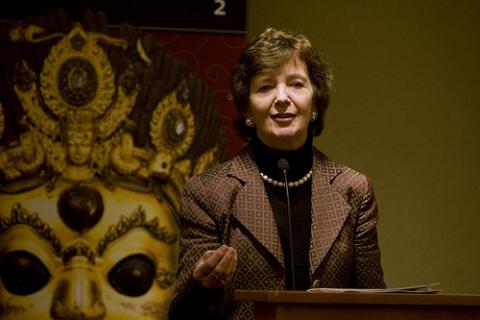Robinson's constitutional challenge was a one-off

The claims of several of the current presidential candidates with regard to the role of the president ignore the constitutional limitations of the office. By Vincent Browne.
In March 1991, Mary Robinson, our then president, almost provoked a constitutional crisis in planning to defy the government and the taoiseach of the day, Charles Haughey, on a matter that related directly to government policy on international relations.
The Dalai Lama, Tenzin Gyatso, leader of the Tibetan government-in-exile, was visiting Ireland. Robinson planned to meet him at a reception at the Chester Beatty Library.
Such a meeting would reasonably have been interpreted as an indication of Irish support for the claims of the Tibetan government-in-exile, as well as a slight to the communist government of China, which claimed an entitlement to incorporate Tibet in the People’s Republic.
A letter from the Taoiseach’s office to Mary Robinson said that it ‘‘wouldn’t be helpful’’ if she were to meet the Dalai Lama. She resolved to meet him anyway, because she had long been a supporter of Tibetan independence. Before leaving the Áras, she spoke to the presidential secretary, Peter Ryan, who was aware of the implications of her intended defiance of the advice from the government and the constitutional controversy it might cause, but she was determined to go ahead.
Article 13.9 of the Constitution clearly states: ‘‘The powers and functions conferred on the President by this Constitution shall be exercisable and performable by him only on the advice of the government, save where it is provided by this Constitution that he shall act in his absolute discretion or after consultation with or in relation to the Council of State, or on the advice or nomination of, or on receipt of any other communication from, any other person or body.”
Here was a case where Robinson was choosing to perform a function in defiance of the government’s advice.
As a constitutional lawyer herself, Robinson was confident that, whereas the exercise of the ‘‘powers and functions’’ conferred on her under the Constitution was constrained by whatever the government wanted, outside of that, in the exercise of other functions, she was a free agent and could do as she wished.
Charles Haughey was clearly of a different view. He might not have cared much about the niceties of the Constitution, but he had apparently taken legal advice on her independent powers. In an earlier discussion, they had clashed on the scope of her role as president (this is all in the authorised biography of Robinson by Olivia O’Leary and Helen Burke).
Robinson was of the view that she could defy the government in speaking her mind and seeing whoever she wanted to see. However, it is difficult to see how what she then intended doing could have been constitutional.
The articles in the Constitution dealing with the role of the president seem carefully crafted to ensure there would never be a conflict between the government of the day and the president on matters of official policy.
For that reason, the Constitution states that the powers and functions conferred on the president are performable only on the advice of the government.
This interpretation of the limitation in presidential powers is shared by the authors of the authoritative textbook on the Constitution, Gerry Hogan and Gerry Whyte, authors of John Kelly: The Irish Constitution, and by another constitutional expert, David Gwynn Morgan of UCC.
Incidentally, the 1991 confrontation was averted when word came from the Taoiseach’s office, moments before Robinson was to leave the Áras, that the government was withdrawing its opposition to her meeting the Dalai Lama.
In 1993, however, there were further difficulties between Robinson and the Albert Reynolds administration over her meeting with Gerry Adams in Belfast.
Mary McAleese never sought to challenge the government of the day in the way that Robinson was prepared to do, although the ‘‘building bridges’’ initiative with loyalist paramilitaries could have caused problems if, for instance, those loyalist groups had reverted to violence and sectarian killing while the initiative was under way.
But the claims of several of the current presidential candidates on how they see the role of the president seem to ignore the constitutional limitations placed on the office. The Irish presidency is an office with very limited independent powers of very small significance.
It is hard to understand why any normal person not intending to lapse into retirement would want to be president.
Michael D Higgins is at the retirement stage of his career, so that’s understandable. Perhaps ditto for David Norris. Martin McGuinness cannot want to be president, since he already has a real job – he must be delighted with the recent opinion poll which shows him doing respectably, boosting the standing of his party yet running little risk of being ‘‘interned without trial’’ in the Áras for seven years.
The others, however, had better watch out.
Image top: Acumen Fund.
